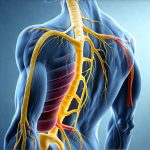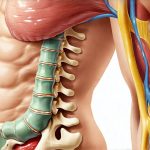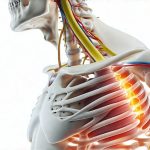The digestive system is often considered the body’s workhorse, responsible for breaking down food, absorbing nutrients, and eliminating waste. When things go awry in this complex process, we typically associate it with dietary issues, infections, or inflammatory bowel diseases. However, what if persistent gut symptoms – bloating, pain, changes in bowel habits – aren’t originating within the digestive system itself? Increasingly, healthcare professionals are recognizing that nerve-related problems can masquerade as purely gastrointestinal complaints, leading to misdiagnosis and ineffective treatment plans. Understanding this connection between the gut and the nervous system is crucial for anyone experiencing chronic or unexplained digestive distress.
The intricate relationship isn’t surprising when you consider how closely intertwined these systems truly are. The “gut-brain axis” isn’t merely a metaphor; it’s a bidirectional communication network involving neural, hormonal, and immunological pathways. Signals constantly travel between the brain and the gut, influencing everything from digestion and nutrient absorption to mood and immune function. Disruptions in this communication can manifest as physical symptoms that are often localized to the digestive tract, even when the underlying cause is neurological. This article will explore how nerve issues can present as gut problems, helping you understand potential causes and encouraging informed conversations with your healthcare provider.
The Gut-Brain Axis: A Two-Way Street
The gut-brain axis operates on multiple levels. One key component is the vagus nerve, a long cranial nerve that directly connects the brain to many internal organs, including the digestive system. It’s essentially a superhighway for information, transmitting signals in both directions. When the vagus nerve malfunctions or becomes hypersensitive, it can lead to altered gut motility (the movement of food through the digestive tract), visceral hypersensitivity (increased pain perception in the abdomen), and changes in gut inflammation. This explains why stress and anxiety – which heavily influence vagal tone – often exacerbate digestive symptoms.
Beyond the vagus nerve, hormonal pathways play a significant role. The gut produces many hormones that impact brain function, such as serotonin (often called the “happiness hormone”). Conversely, the brain releases cortisol (a stress hormone) that can affect gut motility and permeability. Disruptions in these hormonal balances contribute to the complex interplay between mental and physical health. Finally, the immune system is deeply involved; a significant portion of our immunity resides in the gut, and inflammation in one area can easily spill over into others.
The implications for diagnosing digestive issues are profound. A purely gastrointestinal approach might miss underlying neurological factors that are driving the symptoms. For example, someone with irritable bowel syndrome (IBS) may experience relief from dietary changes but still struggle with persistent pain due to heightened nerve sensitivity in the gut. Addressing the nervous system component alongside – or even instead of – solely focusing on diet can be essential for long-term management. If you’re unsure where to start, consider approaches when symptoms don’t match lab results.
Neuropathic Pain and Abdominal Discomfort
Neuropathic pain, resulting from damage or dysfunction of the nerves themselves, is often described as burning, shooting, stabbing, or electric shock-like. While commonly associated with conditions like diabetic neuropathy or shingles, it can also affect the digestive system, mimicking symptoms of other gut disorders. In the abdomen, this manifests as chronic abdominal pain that doesn’t seem to respond to typical treatments for gastrointestinal problems. – It might be constant or intermittent. – It could worsen with specific activities or positions.
Identifying neuropathic abdominal pain is challenging because it often lacks clear inflammatory markers. Standard tests like colonoscopies and endoscopies may come back normal, leaving patients feeling frustrated and dismissed. However, a careful neurological assessment – including evaluating nerve function and sensitivity to touch – can help pinpoint the source of the pain. – Medications used for neuropathic pain elsewhere in the body, such as certain antidepressants or anticonvulsants, might offer some relief. If you’re struggling with persistent gut issues, it may be time to ask your doctor for a full gut check.
The challenge lies in distinguishing between visceral pain (pain originating from the organs themselves) and neuropathic pain. Visceral pain is often diffuse and poorly localized, while neuropathic pain tends to be more sharply defined. This distinction requires a skilled clinician with experience in both gastroenterology and neurology. Importantly, it’s not about deciding which is “real” – both types of pain are valid experiences, but they require different approaches for effective management.
Functional Neurological Disorders (FND) & Gut Symptoms
Functional neurological disorders (FND) represent a complex group of conditions where symptoms occur without detectable structural damage to the nervous system. Instead, the problem lies in how the brain functions – specifically, problems with neural processing and communication. FND often presents as motor symptoms like weakness, tremors, or gait disturbances, but can also manifest primarily as gastrointestinal complaints. – These gut symptoms might include nausea, bloating, constipation, diarrhea, or abdominal pain that doesn’t fit neatly into a specific diagnosis.
The link between FND and gut issues stems from the brain’s role in regulating digestive function. In FND, the brain may send incorrect signals to the gut, leading to altered motility, visceral hypersensitivity, and impaired gut-brain communication. This can result in symptoms that closely resemble those of IBS or other functional gastrointestinal disorders. The key difference is that the focus isn’t on structural abnormalities within the digestive tract; it’s about how the brain processes sensory information and controls bodily functions. Sometimes a second opinion can help clarify things.
Diagnosing FND requires a thorough evaluation by a neurologist specializing in functional disorders. This often involves ruling out other potential causes, conducting neurological exams to assess motor function and sensory perception, and carefully considering the patient’s history and psychological factors. Treatment typically focuses on rehabilitation therapies – such as physiotherapy, occupational therapy, and psychotherapy – aimed at retraining the brain and restoring normal neural pathways.
Small Fiber Neuropathy (SFN) & Digestive Manifestations
Small fiber neuropathy (SFN) is a nerve disorder affecting small sensory fibers responsible for pain, temperature, and autonomic functions. While often manifesting as burning pain in the feet and legs, SFN can also significantly impact the digestive system. The small nerve fibers play a crucial role in regulating gut motility, sensation, and inflammation. When these nerves are damaged or dysfunctional, it can lead to a wide range of gastrointestinal symptoms. – These include chronic abdominal pain, bloating, nausea, diarrhea, constipation, and even fecal incontinence.
Diagnosing SFN requires specialized testing, such as skin biopsies to assess nerve fiber density. This is because standard neurological exams may not always detect the subtle damage characteristic of SFN. The cause of SFN can be varied – including diabetes, autoimmune diseases, viral infections, or it can be idiopathic (meaning no clear cause is identified). Treatment focuses on managing pain and improving gut function. – Medications targeting nerve pain are often used, along with lifestyle modifications to support overall health.
Importantly, recognizing SFN as a potential cause of chronic digestive symptoms can prevent years of unnecessary testing and treatment for gastrointestinal conditions that aren’t present. It highlights the importance of considering neurological factors when evaluating persistent gut problems, especially when standard treatments fail to provide relief. A multidisciplinary approach involving gastroenterologists, neurologists, and pain management specialists is often the most effective way to manage SFN-related digestive symptoms. If you suspect inflammation might be a factor, testing used to rule out inflammation when gut pain is vague can be helpful. It’s also important to understand if your issues are functional or structural. Finally, consider when an MRI is better than a CT for gut issues in certain cases.


















